bio
-
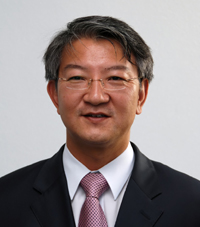 Prof. Lee Appointed to Advisory Board of the U.S. Joint BioEnergy Institute
Prof. Sang-Yup Lee of the Department of Chemical and Biomolecular Engineering, KAIST, has been appointed as a member of the scientific advisory board of the Joint BioEnergy Institute under the wing of the U.S. Department of Energy, university authorities said on Monday (Aug. 4).
The Joint BioEnergy Institute (JBEI) is a scientific partnership in the San Francisco Bay area, California, led by Lawrence Berkeley National Laboratory (Berkeley Lab). Its partner organizations include the Sandia National Laboratories, the University of California in Berkeley, UC Davis, the Carnegie Institution for Science and the Lawrence Livermore National Laboratory.
JBEI
2008.08.07 View 11644
Prof. Lee Appointed to Advisory Board of the U.S. Joint BioEnergy Institute
Prof. Sang-Yup Lee of the Department of Chemical and Biomolecular Engineering, KAIST, has been appointed as a member of the scientific advisory board of the Joint BioEnergy Institute under the wing of the U.S. Department of Energy, university authorities said on Monday (Aug. 4).
The Joint BioEnergy Institute (JBEI) is a scientific partnership in the San Francisco Bay area, California, led by Lawrence Berkeley National Laboratory (Berkeley Lab). Its partner organizations include the Sandia National Laboratories, the University of California in Berkeley, UC Davis, the Carnegie Institution for Science and the Lawrence Livermore National Laboratory.
JBEI
2008.08.07 View 11644 -
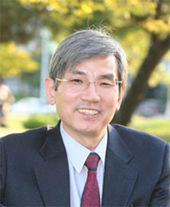 Storing Stably Hydrogen Atoms in Icy Materials Discovered
KAIST, Aug. 8, 2008 -- A KAIST research team led by Prof. Huen Lee of the Department of Chemical & Biomolecular Engineering has discovered that icy organic hydrates, which contain small cages that can trap guest molecules, can be used to create and trap hydrogen atoms at higher temperatures.
The properties and reactions of single hydrogen atoms are of great scientific interest because of their inherent quantum mechanical behavior; experimentally, they can be generated and stabilized at very low temperatures (4 K) by high-energy irradiation of solid molecular hydrogen.
The finding was reported in the journal of American Chemical Society and featured in the "Editor"s Choice" in the July 11 issue of Science as a recent research highlight.
Hydrogen is a clean and sustainable form of energy that can be used in mobile and stationary applications. Hydrogen has the potential to solve several major challenges today: depletion of fossil fuels, poor air quality, and green house gas emissions.
However, the trapping of hydrogen atoms in crystalline solid matrix has never been attempted mainly because of experimental difficulties in identifying the generated hydrogen atoms with either spectroscopic or microscopic technique.
"To overcome the barriers and limitations of the existing storage approaches, we have continuously attempted to find the new hydrogen storage media such as icy powders and other related inclusion compounds," said Prof. Lee
The discovery follows the breakthrough concept Prof. Lee"s research team proposed in Nature in 2005 to use pure ice to capture and store hydrogen molecules. At moderate temperature and pressure conditions small guest molecules are entrapped in pure ice powders to form the mixed icy hydrate materials.
"Stable existence of single hydrogen molecule/radical in icy crystalline matrices may offer significant advantages in exploring hydrogen as a quantum medium because icy hydrogen hydrates can be formed at milder conditions when compared with pure solid hydrogen, which requires the ultra low temperature of 4.2 K," said Prof. Lee.
The novel design and synthesis of ionic and radicalized icy hydrates are expected to open a new field for inclusion chemistry and ice-based science and technology. Specifically, the fact that hydrogen atoms can be stably stored in icy materials might provide versatile and practical applications to energy devices including fuel cells, ice-induced reactions, and novel energy storage process, according to the KAIST professor.
2008.08.07 View 12650
Storing Stably Hydrogen Atoms in Icy Materials Discovered
KAIST, Aug. 8, 2008 -- A KAIST research team led by Prof. Huen Lee of the Department of Chemical & Biomolecular Engineering has discovered that icy organic hydrates, which contain small cages that can trap guest molecules, can be used to create and trap hydrogen atoms at higher temperatures.
The properties and reactions of single hydrogen atoms are of great scientific interest because of their inherent quantum mechanical behavior; experimentally, they can be generated and stabilized at very low temperatures (4 K) by high-energy irradiation of solid molecular hydrogen.
The finding was reported in the journal of American Chemical Society and featured in the "Editor"s Choice" in the July 11 issue of Science as a recent research highlight.
Hydrogen is a clean and sustainable form of energy that can be used in mobile and stationary applications. Hydrogen has the potential to solve several major challenges today: depletion of fossil fuels, poor air quality, and green house gas emissions.
However, the trapping of hydrogen atoms in crystalline solid matrix has never been attempted mainly because of experimental difficulties in identifying the generated hydrogen atoms with either spectroscopic or microscopic technique.
"To overcome the barriers and limitations of the existing storage approaches, we have continuously attempted to find the new hydrogen storage media such as icy powders and other related inclusion compounds," said Prof. Lee
The discovery follows the breakthrough concept Prof. Lee"s research team proposed in Nature in 2005 to use pure ice to capture and store hydrogen molecules. At moderate temperature and pressure conditions small guest molecules are entrapped in pure ice powders to form the mixed icy hydrate materials.
"Stable existence of single hydrogen molecule/radical in icy crystalline matrices may offer significant advantages in exploring hydrogen as a quantum medium because icy hydrogen hydrates can be formed at milder conditions when compared with pure solid hydrogen, which requires the ultra low temperature of 4.2 K," said Prof. Lee.
The novel design and synthesis of ionic and radicalized icy hydrates are expected to open a new field for inclusion chemistry and ice-based science and technology. Specifically, the fact that hydrogen atoms can be stably stored in icy materials might provide versatile and practical applications to energy devices including fuel cells, ice-induced reactions, and novel energy storage process, according to the KAIST professor.
2008.08.07 View 12650 -
 KAIST Professors Article Featured as Cover Thesis of Biotechnology Journal
An article authored by a research team of Prof. Sang-yup Lee at the Department of Chemical and Biomolecular Engineering and Dr. Jin-Hwan Park at the KAIST Institute for the BioCentury has been featured as the cover thesis of the August 2008 issue of Trends in Biotechnology.
The paper, titled "General strategy for strain improvement by means of systems metabolic engineering," focuses on the application of systems biology for the development of strains and illustrates future prospects. Trends in Biotechnology, published by Cell Press, is one of the most prestigious review journals in the field.
Jin-Hwan Park, the primary author of the research thesis, said that the KAIST team"s research work was expected to provide substantial help to researchers involved in biotechnology industry.
The strategy has been established on the basis of the experiences gained in the actual microbial production process using the systems biology methods which his research team has recently worked on, Prof. Park said.
2008.07.24 View 13831
KAIST Professors Article Featured as Cover Thesis of Biotechnology Journal
An article authored by a research team of Prof. Sang-yup Lee at the Department of Chemical and Biomolecular Engineering and Dr. Jin-Hwan Park at the KAIST Institute for the BioCentury has been featured as the cover thesis of the August 2008 issue of Trends in Biotechnology.
The paper, titled "General strategy for strain improvement by means of systems metabolic engineering," focuses on the application of systems biology for the development of strains and illustrates future prospects. Trends in Biotechnology, published by Cell Press, is one of the most prestigious review journals in the field.
Jin-Hwan Park, the primary author of the research thesis, said that the KAIST team"s research work was expected to provide substantial help to researchers involved in biotechnology industry.
The strategy has been established on the basis of the experiences gained in the actual microbial production process using the systems biology methods which his research team has recently worked on, Prof. Park said.
2008.07.24 View 13831 -
 KAIST Professor Named International Research Grant Reviewer
Prof. Kwang-Hyun Cho of the Department of Bio and Brain Engineering, KAIST, was appointed as a research grant review committee member of the international Human Frontier Science Program (HFSP) for 2008-2009, university authorities reported.
The HFSP is a funding agency that supports international collaboration in interdisciplinary, basic research in the life sciences. It was initiated in 1989 by G7 countries as the sole funding program for international researches in neuroscience and molecular biology. The HFSP now has a membership of 35 countries and Korea joined the program in 2004. Prof. Cho will be responsible for reviewing grant applications in the field of systems biology.
Prof. Cho received B.S., M.S. and Ph.D. degrees in electrical engineering from KAIST in 1993, 1995, and 1998, respectively. He has been working as a director of the KAIST Institute for the BioCentury and KAIST"s Laboratory for Systems Biology and Bio-Inspired Engineering. He has been serving on editorial advisory boards of various international science journals, including Systems and Synthetic Biology (Springer, Netherlands, from 2006), BMC Systems Biology (BMC, London, U.K., from 2007) and Gene Regulation and Systems Biology (Libertas Academica, New Zealand, from 2007).
He is a senior member of the Engineering in Medicine and Biology Society (EMBS) affiliated with the Institute of Electronics and Electrical Engineers (IEEE). His research interests cover the areas of systems science with bio-medical applications, especially systems biology and bio-inspired engineering based on molecular systems biology.
2008.07.18 View 17126
KAIST Professor Named International Research Grant Reviewer
Prof. Kwang-Hyun Cho of the Department of Bio and Brain Engineering, KAIST, was appointed as a research grant review committee member of the international Human Frontier Science Program (HFSP) for 2008-2009, university authorities reported.
The HFSP is a funding agency that supports international collaboration in interdisciplinary, basic research in the life sciences. It was initiated in 1989 by G7 countries as the sole funding program for international researches in neuroscience and molecular biology. The HFSP now has a membership of 35 countries and Korea joined the program in 2004. Prof. Cho will be responsible for reviewing grant applications in the field of systems biology.
Prof. Cho received B.S., M.S. and Ph.D. degrees in electrical engineering from KAIST in 1993, 1995, and 1998, respectively. He has been working as a director of the KAIST Institute for the BioCentury and KAIST"s Laboratory for Systems Biology and Bio-Inspired Engineering. He has been serving on editorial advisory boards of various international science journals, including Systems and Synthetic Biology (Springer, Netherlands, from 2006), BMC Systems Biology (BMC, London, U.K., from 2007) and Gene Regulation and Systems Biology (Libertas Academica, New Zealand, from 2007).
He is a senior member of the Engineering in Medicine and Biology Society (EMBS) affiliated with the Institute of Electronics and Electrical Engineers (IEEE). His research interests cover the areas of systems science with bio-medical applications, especially systems biology and bio-inspired engineering based on molecular systems biology.
2008.07.18 View 17126 -
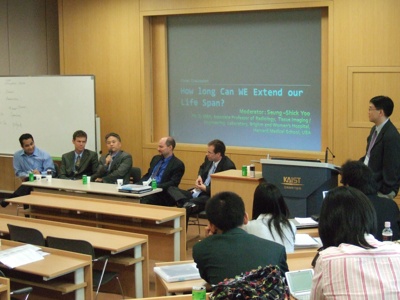 Int'l Conference for Integration of Science & Technology into Society Opens
The 2008 International Conference for the Integration of Science and Technology into Society (ICISTS-KAIST) opened a four-day meeting on Tuesday (July 15) at Daejeon KAIST campus. The conference is an annual event organized by a group of KAIST undergraduate students.
The fifth-year gathering is designed to provide participants with an opportunity to broaden their scientific perspectives by sharing ideas and experiences in related topics, as well as building an international human network. This year"s event has drawn about 200 students from 40 countries.
The centerpiece of the conference is three workshops on the following themes; Human-Robot Symbiotic Society, Neo-brain Science and Trafficmatics. Myung-Ja Kim, former Korean Environment Minister, will appear as a keynote speaker.
In the workshop sessions, two speakers will discuss specific issues and arrive at a tentative conclusion. Participants will have the opportunity to participate in the debate through Q&A for each session.
The first theme "Human-Robot Symbiotic Society" delves into the current trend that robot is being transformed into a perceivable and touchable concept from an abstract one. Guests for the workship include June-Ho Oh, professor at the Department of Mechanical Engineering, KAIST; James Dater, professor at the Department of Political Science, University of Hawaii at Manoa, and Director of the Hawaii Research Center for Future; Michael Pollitt, CEO of Shadow Robot Company; and Steven Dubowsky, professor at the Department of Mechanical Engineering, MIT.
The second theme "Neo-Brain Science" focuses on attempts to shed light on brain from diverse perspectives including psychology, economics and art. Among invited speakers are Prof. Jai-Seung Jung at the Department of Bio and Brain Engineering, KAIST; Prof. Un-Jung Kang at the University of Chicago Medical Center; and Peter Geyer, a consultant for the Association for Psychological Type.
The third workshop on "Traffimatics" will deal with "intelligent transport systems (ITS)" which will discusst new paradigm in transportation policy and traffic engineering. On the list of speakers are Assaf Biderman, assistant director, SENSEable City Laboratory, MIT; Prof. Richard Tay, at the Department of Civil Engineering, University of Calgary; Prof. Shoshi Mizokami at Kumamoto University; and Ho-Jong Baik, research associate professor of Virginia Tech.
2008.07.16 View 17287
Int'l Conference for Integration of Science & Technology into Society Opens
The 2008 International Conference for the Integration of Science and Technology into Society (ICISTS-KAIST) opened a four-day meeting on Tuesday (July 15) at Daejeon KAIST campus. The conference is an annual event organized by a group of KAIST undergraduate students.
The fifth-year gathering is designed to provide participants with an opportunity to broaden their scientific perspectives by sharing ideas and experiences in related topics, as well as building an international human network. This year"s event has drawn about 200 students from 40 countries.
The centerpiece of the conference is three workshops on the following themes; Human-Robot Symbiotic Society, Neo-brain Science and Trafficmatics. Myung-Ja Kim, former Korean Environment Minister, will appear as a keynote speaker.
In the workshop sessions, two speakers will discuss specific issues and arrive at a tentative conclusion. Participants will have the opportunity to participate in the debate through Q&A for each session.
The first theme "Human-Robot Symbiotic Society" delves into the current trend that robot is being transformed into a perceivable and touchable concept from an abstract one. Guests for the workship include June-Ho Oh, professor at the Department of Mechanical Engineering, KAIST; James Dater, professor at the Department of Political Science, University of Hawaii at Manoa, and Director of the Hawaii Research Center for Future; Michael Pollitt, CEO of Shadow Robot Company; and Steven Dubowsky, professor at the Department of Mechanical Engineering, MIT.
The second theme "Neo-Brain Science" focuses on attempts to shed light on brain from diverse perspectives including psychology, economics and art. Among invited speakers are Prof. Jai-Seung Jung at the Department of Bio and Brain Engineering, KAIST; Prof. Un-Jung Kang at the University of Chicago Medical Center; and Peter Geyer, a consultant for the Association for Psychological Type.
The third workshop on "Traffimatics" will deal with "intelligent transport systems (ITS)" which will discusst new paradigm in transportation policy and traffic engineering. On the list of speakers are Assaf Biderman, assistant director, SENSEable City Laboratory, MIT; Prof. Richard Tay, at the Department of Civil Engineering, University of Calgary; Prof. Shoshi Mizokami at Kumamoto University; and Ho-Jong Baik, research associate professor of Virginia Tech.
2008.07.16 View 17287 -
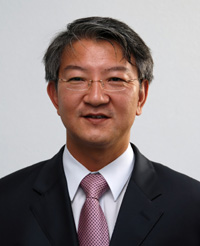 KAIST, GS Caltex Jointly Develop New Bacteria to Produce Biobutanol
KAIST and GS Caltex, Korea"s second-largest refiner, have jointly developed a new strain of bacteria to produce biobutanol, which is regarded as a promising next-generation biofuel, KAIST authorities said on Monday (June 2).
A research team led by Prof. Sang-Yup Lee of the Chemical and Biomolecular Engineering Department and researchers of GS Caltex succeeded in developing an improved strain of bacteria which enables to produce a large amount of biobutanol in the process of fermenting biomass. The research team has applied for international patent for the new technology.
Biomass refers to living and recently dead biological material that can be used as fuel or for industrial production. It usually refers to plant matter grown for use as biofuel, but it also includes plant or animal matter used for production of fibers, chemicals or heat.
In the 1970s and 1980s when scientists began researching the possibilities of alternative fuels, bacteria were used in the process of fermenting biomass. This ABE (acetone, butanol, ethanol) fermentation process yields butanol, acetone, and ethanol in a ratio of 6:3:1, respectively. Acetone produced in this process is not usable.
The newly developed technology to produce biobutanol has an advantage of lowering production cost by eliminating the process to separate acetone from butanol. This has been made possible by improving the bacteria used for the fermentation in metabolic engineering terms, and producing butanol and ethanol only in a ratio of 6:1, while curbing the generation of acetone.
In comparison with bioethanol, also a biofuel mixture which is currently under widespread use in some countries, butanol is more easily transported with gasoline and diesel through pipelines because of its lower tendency to separate from the fuel when contaminated with water. Butanol is also less corrosive than ethanol, another reason its transport through pipeline is preferable.
Global interest in full utilization of biomass and development of other alternative energy including biobutanol has deepened in recent years, as crude oil prices have skyrocketed to record levels and climate changes resulting from the excessive use of fossil fuel have been causing various problems around the world.
2008.06.04 View 11720
KAIST, GS Caltex Jointly Develop New Bacteria to Produce Biobutanol
KAIST and GS Caltex, Korea"s second-largest refiner, have jointly developed a new strain of bacteria to produce biobutanol, which is regarded as a promising next-generation biofuel, KAIST authorities said on Monday (June 2).
A research team led by Prof. Sang-Yup Lee of the Chemical and Biomolecular Engineering Department and researchers of GS Caltex succeeded in developing an improved strain of bacteria which enables to produce a large amount of biobutanol in the process of fermenting biomass. The research team has applied for international patent for the new technology.
Biomass refers to living and recently dead biological material that can be used as fuel or for industrial production. It usually refers to plant matter grown for use as biofuel, but it also includes plant or animal matter used for production of fibers, chemicals or heat.
In the 1970s and 1980s when scientists began researching the possibilities of alternative fuels, bacteria were used in the process of fermenting biomass. This ABE (acetone, butanol, ethanol) fermentation process yields butanol, acetone, and ethanol in a ratio of 6:3:1, respectively. Acetone produced in this process is not usable.
The newly developed technology to produce biobutanol has an advantage of lowering production cost by eliminating the process to separate acetone from butanol. This has been made possible by improving the bacteria used for the fermentation in metabolic engineering terms, and producing butanol and ethanol only in a ratio of 6:1, while curbing the generation of acetone.
In comparison with bioethanol, also a biofuel mixture which is currently under widespread use in some countries, butanol is more easily transported with gasoline and diesel through pipelines because of its lower tendency to separate from the fuel when contaminated with water. Butanol is also less corrosive than ethanol, another reason its transport through pipeline is preferable.
Global interest in full utilization of biomass and development of other alternative energy including biobutanol has deepened in recent years, as crude oil prices have skyrocketed to record levels and climate changes resulting from the excessive use of fossil fuel have been causing various problems around the world.
2008.06.04 View 11720 -
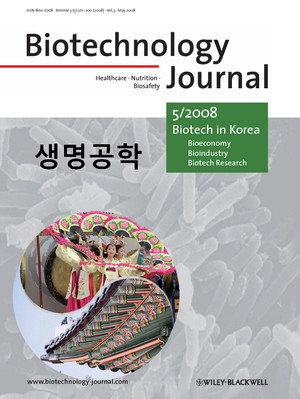 International Science Journal Spotlights Korean Biotechnology
Biotechnology Journal published by German-based Wiley-VCH, one of the world"s major scientific and technical publishers, devoted its entire special edition for May to biotechnology in Korea.
The monthly journal"s special issue was planned by KAIST Professor Sang-Yup Lee of the Chemical and Biomolecular Engineering Department who is one of the journal"s two editors-in-chief.
The special issue outlines the current status and future prospect of biotechnology in Korea, and presents five review papers and eight original papers by leading Korean biotech researchers to showcase recent developments in Korean biotechnology. Among these papers, a review by Dr. Byung-Hwan Hyeon and his colleagues describes in detail the Korean biotechnology strategies represented by "Bio-Vision 2016," and another by Dr. Ji-Hyun Kim and his collaborators presents recent progress in microbial genome projects in Korea.
In the editorial of the journal, Prof. Lee said, "Heavy industry and IT industry have been the two drivers of Korean economic growth. Korea is now considering biotechnology as its next generation growth engine."
Underscoring the growing importance of fusion research, he mentioned that integration of biotechnology with information technology and nanotechnology is advancing rapidly in Korea. Another special edition of Biotechnology Journal focusing on these exciting biotech developments in Korea is planned for the future.
2008.05.20 View 12857
International Science Journal Spotlights Korean Biotechnology
Biotechnology Journal published by German-based Wiley-VCH, one of the world"s major scientific and technical publishers, devoted its entire special edition for May to biotechnology in Korea.
The monthly journal"s special issue was planned by KAIST Professor Sang-Yup Lee of the Chemical and Biomolecular Engineering Department who is one of the journal"s two editors-in-chief.
The special issue outlines the current status and future prospect of biotechnology in Korea, and presents five review papers and eight original papers by leading Korean biotech researchers to showcase recent developments in Korean biotechnology. Among these papers, a review by Dr. Byung-Hwan Hyeon and his colleagues describes in detail the Korean biotechnology strategies represented by "Bio-Vision 2016," and another by Dr. Ji-Hyun Kim and his collaborators presents recent progress in microbial genome projects in Korea.
In the editorial of the journal, Prof. Lee said, "Heavy industry and IT industry have been the two drivers of Korean economic growth. Korea is now considering biotechnology as its next generation growth engine."
Underscoring the growing importance of fusion research, he mentioned that integration of biotechnology with information technology and nanotechnology is advancing rapidly in Korea. Another special edition of Biotechnology Journal focusing on these exciting biotech developments in Korea is planned for the future.
2008.05.20 View 12857 -
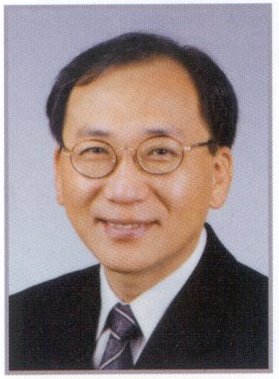 World Micromachine Summit to Open in Daejeon
The 2008 World Micromachine Summit will be held at Hotel Riviera in Daejeon for a four-day run from April 30, drawing worldwide industrial and academic leaders in the micro-nano-technology (MNT).
Organizers say that 76 delegates and 56 observers from 19 countries and regions will take part in this year"s Micromachine Summit. Prof. Cho Young-ho of the Department of Bio & Brain Engineering of KAIST will play host to the annual event.
Participants will discuss the progress of micro-nano-technology in each country and region development of national policies in this area. The Summit was first organized in 1995 by the Micromachine Center of Japan with representatives from 10 countries participating. They were Australia, Canada, Germany, Italy, Japan, the Netherlands, Switzerland, the United Kingdom, and the United States.
Korea was first invited to the conference in 1999. Since then, Korea has played an active role in promoting technological exchanges among nations and has conducted presentations and discussions on major technological breakthroughs.
During the four-day run, each delegation will outline their country"s policies and strategies and present local features on focused areas including this year"s main theme, "Micromachine towards Technology Convergence Era."
The gathering will offer a valuable opportunity for the participants to exchange and collect information on the current state of the MNT, as well as providing a forum for worldwide networking of leaders in the area.
2008.04.29 View 12137
World Micromachine Summit to Open in Daejeon
The 2008 World Micromachine Summit will be held at Hotel Riviera in Daejeon for a four-day run from April 30, drawing worldwide industrial and academic leaders in the micro-nano-technology (MNT).
Organizers say that 76 delegates and 56 observers from 19 countries and regions will take part in this year"s Micromachine Summit. Prof. Cho Young-ho of the Department of Bio & Brain Engineering of KAIST will play host to the annual event.
Participants will discuss the progress of micro-nano-technology in each country and region development of national policies in this area. The Summit was first organized in 1995 by the Micromachine Center of Japan with representatives from 10 countries participating. They were Australia, Canada, Germany, Italy, Japan, the Netherlands, Switzerland, the United Kingdom, and the United States.
Korea was first invited to the conference in 1999. Since then, Korea has played an active role in promoting technological exchanges among nations and has conducted presentations and discussions on major technological breakthroughs.
During the four-day run, each delegation will outline their country"s policies and strategies and present local features on focused areas including this year"s main theme, "Micromachine towards Technology Convergence Era."
The gathering will offer a valuable opportunity for the participants to exchange and collect information on the current state of the MNT, as well as providing a forum for worldwide networking of leaders in the area.
2008.04.29 View 12137 -
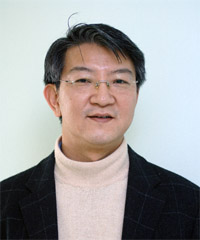 Prof. Sang-Yup Lee Co-Editor-in-Chief of Biotechnology Journal
Prof. Sang-Yup Lee of KAIST"s Department of Chemical and Biomolecular Engineering has been appointed as co-editor-in-chief of Biotechnology Journal published by Wiley-VCH, a German-based leading technical publisher, university authorities said Tuesday, April 15.
Launched in January 2006, Biotechnology Journal has covered biological process, brain ailments, biological medicine, protein design and other applied bio-sciences.
Starting in May, Lee will be responsible for setting and overseeing editorial direction of the journal along with Prof. Alois Jungbauer of Austria.
Professor Lee has been gaining recognition in and outside the country for his research on metabolic engineering. In 2002, he was chosen as one of Asia"s next generation leaders by the World Economic Forum. In 2007, Lee was elected a fellow of the American Association for the Advancement of Science, the world"s largest general scientific society. He is also serving as an editorial member of more than ten international journals including Biotechnology & Bioengineering.
Awards and honors include the First Young Scientist"s Award from the President of Korea, the Scientist of the Month Award from the Korean Ministry of Science and Technology, the Best Patent Award from Korean Intellectual Property Office, the Citation Classic Award from ISI, USA, and the First Elmer Gaden Award (1999 Best Paper Award) from Biotechnology and Bioengineering (John Wiley & Sons, USA) at the ACS National meeting.
2008.04.16 View 12819
Prof. Sang-Yup Lee Co-Editor-in-Chief of Biotechnology Journal
Prof. Sang-Yup Lee of KAIST"s Department of Chemical and Biomolecular Engineering has been appointed as co-editor-in-chief of Biotechnology Journal published by Wiley-VCH, a German-based leading technical publisher, university authorities said Tuesday, April 15.
Launched in January 2006, Biotechnology Journal has covered biological process, brain ailments, biological medicine, protein design and other applied bio-sciences.
Starting in May, Lee will be responsible for setting and overseeing editorial direction of the journal along with Prof. Alois Jungbauer of Austria.
Professor Lee has been gaining recognition in and outside the country for his research on metabolic engineering. In 2002, he was chosen as one of Asia"s next generation leaders by the World Economic Forum. In 2007, Lee was elected a fellow of the American Association for the Advancement of Science, the world"s largest general scientific society. He is also serving as an editorial member of more than ten international journals including Biotechnology & Bioengineering.
Awards and honors include the First Young Scientist"s Award from the President of Korea, the Scientist of the Month Award from the Korean Ministry of Science and Technology, the Best Patent Award from Korean Intellectual Property Office, the Citation Classic Award from ISI, USA, and the First Elmer Gaden Award (1999 Best Paper Award) from Biotechnology and Bioengineering (John Wiley & Sons, USA) at the ACS National meeting.
2008.04.16 View 12819 -
 2008 Commencement Ceremony Held
The 2008 KAIST Commencement Ceremony was held on Feb. 29 at the KAIST Amphitheater in the presence of KAIST President Nam Pyo Suh, U.S. Ambassador to Korea Alexander Vershbow, alumni representatives and parents.
Other dignitaries on hand included National Assemblymen Sang-Kee Suh, Chang-Sun Hong and Sang-Min Lee; and Daejoen City Major Sung-Hyo Park.
President Suh and Vice President Soon-Heung Chang presented degrees to each of the 1,321 graduates (200 doctors, 725 masters and 396 bachelors) instead of just to representatives. Since its inception in 1971, KAIST has produced 7,067 Ph.D. graduates, 18,636 master"s degree holders and 8,998 bachelor"s degree holders. This year, 40 percent of the Ph.D. graduates, 79, were in their twenties upon graduation.
President Suh called on the graduates to return the favor they received from society by making their share of contributions to humanity. "You were chosen to be students of this unique university because the Korean people -- not only KAIST professors and staff, but also ordinary taxpayers -- believe that outstanding young people like you can change the world in which we live for the better. Now it is time for you to pay back their support," he said.
Notable graduates of this year include So-Yeon Yi, 29, the first Korean female astronaut candidate, who earned her doctorate degree in bio and brain engineering. She was granted a special award in recognition of her role in advancing space science in Korea but she could not attend the graduation ceremony due to her training schedule in Russia which will continue until April.
Eun-Gyu Oh, 26, was the youngest doctorate recipient in the ceremony and Won Hye-jeong, 21, recorded the top undergraduate GPA with a score of 4.20 over 4.3. Civil and environmental engineering major Seung-Hee Park, 28, published a total of eight papers in major international journals while attending KAIST and two more papers are currently under review.
So-Yeon Yi said: ``I frequently stayed up all night to research and write the paper. It was tough experience for me. Thanks to ceaseless support from professors and colleagues, however, I was able to complete the task,"" she said. ``I have done my best in studying, exercising and so on. I"m sure that my active, participatory attitude brought about this honorable moment.""
She is now training at Gagarin Cosmonaut Training Center near Moscow as a replacement astronaut in case Koh San, 31, who is to be the first Korean astronaut, is unable to go into orbit.
Koh and Yi were selected from more than 36,000 applicants last year. Koh was finally picked as the primary candidate last September. The two are serving as space ambassadors appointed by the Ministry of Science & Technology.
2008.03.09 View 14274
2008 Commencement Ceremony Held
The 2008 KAIST Commencement Ceremony was held on Feb. 29 at the KAIST Amphitheater in the presence of KAIST President Nam Pyo Suh, U.S. Ambassador to Korea Alexander Vershbow, alumni representatives and parents.
Other dignitaries on hand included National Assemblymen Sang-Kee Suh, Chang-Sun Hong and Sang-Min Lee; and Daejoen City Major Sung-Hyo Park.
President Suh and Vice President Soon-Heung Chang presented degrees to each of the 1,321 graduates (200 doctors, 725 masters and 396 bachelors) instead of just to representatives. Since its inception in 1971, KAIST has produced 7,067 Ph.D. graduates, 18,636 master"s degree holders and 8,998 bachelor"s degree holders. This year, 40 percent of the Ph.D. graduates, 79, were in their twenties upon graduation.
President Suh called on the graduates to return the favor they received from society by making their share of contributions to humanity. "You were chosen to be students of this unique university because the Korean people -- not only KAIST professors and staff, but also ordinary taxpayers -- believe that outstanding young people like you can change the world in which we live for the better. Now it is time for you to pay back their support," he said.
Notable graduates of this year include So-Yeon Yi, 29, the first Korean female astronaut candidate, who earned her doctorate degree in bio and brain engineering. She was granted a special award in recognition of her role in advancing space science in Korea but she could not attend the graduation ceremony due to her training schedule in Russia which will continue until April.
Eun-Gyu Oh, 26, was the youngest doctorate recipient in the ceremony and Won Hye-jeong, 21, recorded the top undergraduate GPA with a score of 4.20 over 4.3. Civil and environmental engineering major Seung-Hee Park, 28, published a total of eight papers in major international journals while attending KAIST and two more papers are currently under review.
So-Yeon Yi said: ``I frequently stayed up all night to research and write the paper. It was tough experience for me. Thanks to ceaseless support from professors and colleagues, however, I was able to complete the task,"" she said. ``I have done my best in studying, exercising and so on. I"m sure that my active, participatory attitude brought about this honorable moment.""
She is now training at Gagarin Cosmonaut Training Center near Moscow as a replacement astronaut in case Koh San, 31, who is to be the first Korean astronaut, is unable to go into orbit.
Koh and Yi were selected from more than 36,000 applicants last year. Koh was finally picked as the primary candidate last September. The two are serving as space ambassadors appointed by the Ministry of Science & Technology.
2008.03.09 View 14274 -
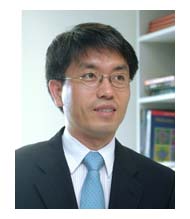 Prof. Chung Named Winner of 2008 KAIST Scientific Award
Professor Chung Jong-Kyeong of the Department of Biological Sciences was named the winner of the 2008 KAIST Scientific Award.
The prize was awarded by KAIST President Suh Nam-Pyo during the 37th KAIST anniversary ceremony on Feb. 16.
Chung was cited for disclosing the new anti-cancer aspect of adenosine monophosphate-activated protein kinase (AMPK). His papers, published in the science magazine Nature in 2006 and again in 2007, revealed that the protein could be used to treat certain forms of cancer, as well as prevent malignant growths.
2008.02.28 View 12221
Prof. Chung Named Winner of 2008 KAIST Scientific Award
Professor Chung Jong-Kyeong of the Department of Biological Sciences was named the winner of the 2008 KAIST Scientific Award.
The prize was awarded by KAIST President Suh Nam-Pyo during the 37th KAIST anniversary ceremony on Feb. 16.
Chung was cited for disclosing the new anti-cancer aspect of adenosine monophosphate-activated protein kinase (AMPK). His papers, published in the science magazine Nature in 2006 and again in 2007, revealed that the protein could be used to treat certain forms of cancer, as well as prevent malignant growths.
2008.02.28 View 12221 -
 KAIST Holds Symposium on Metabolic Engineering
The KAIST Institute for Bio-Century held a symposium on metabolic engineering at the auditorium of the KAIST"s Applied Engineering Bldg. on Thursday, Feb. 14, in cooperation with the BK21 Chemical Engineering Research Team.
The symposium focused on researches on bio-refinery program and bio-energy production in connection with steep hikes in oil prices and worsening environmental problems, including global warming.
Seven Korean experts presented their views on metabolic engineering strategies to effectively produce bio-energy and biofuel and the latest research trends.
Among the speakers, Prof. Lee Sang-yup, co-head of the KAIST Institute for Bio-Century, spoke on the theme of "Metabolic Engineering for Bio-refinery and Bio-energy.
The symposium provided an opportunity to take a glimpse into the latest research trends of metabolic engineering technology. Metabolic engineering technology is crucial to producing chemicals, energy and other substances from renewable biomass materials in a departure from heavy reliance on crude oil.
2008.02.14 View 12619
KAIST Holds Symposium on Metabolic Engineering
The KAIST Institute for Bio-Century held a symposium on metabolic engineering at the auditorium of the KAIST"s Applied Engineering Bldg. on Thursday, Feb. 14, in cooperation with the BK21 Chemical Engineering Research Team.
The symposium focused on researches on bio-refinery program and bio-energy production in connection with steep hikes in oil prices and worsening environmental problems, including global warming.
Seven Korean experts presented their views on metabolic engineering strategies to effectively produce bio-energy and biofuel and the latest research trends.
Among the speakers, Prof. Lee Sang-yup, co-head of the KAIST Institute for Bio-Century, spoke on the theme of "Metabolic Engineering for Bio-refinery and Bio-energy.
The symposium provided an opportunity to take a glimpse into the latest research trends of metabolic engineering technology. Metabolic engineering technology is crucial to producing chemicals, energy and other substances from renewable biomass materials in a departure from heavy reliance on crude oil.
2008.02.14 View 12619